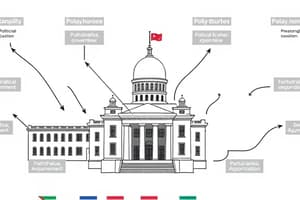Podcast
Questions and Answers
What is crucial for analyzing political dynamics?
What is crucial for analyzing political dynamics?
- Understanding economic theories
- Comprehensive understanding of polity (correct)
- Strong personal opinions
- Knowledge of historical events
Which challenges do modern political systems face?
Which challenges do modern political systems face?
- Simplified governance structures
- Decreased citizen participation
- Inflexible legal frameworks
- Globalization and technological advancements (correct)
What aspect of polity helps in understanding how decisions are made?
What aspect of polity helps in understanding how decisions are made?
- Political culture
- Political institutions (correct)
- Public opinion
- Social movements
Which aspect of polity highlights the complexities of modern political systems?
Which aspect of polity highlights the complexities of modern political systems?
How does understanding political culture benefit the analysis of policy?
How does understanding political culture benefit the analysis of policy?
What does polity primarily refer to?
What does polity primarily refer to?
Which of the following is a component of sovereignty?
Which of the following is a component of sovereignty?
How does legitimacy affect a polity?
How does legitimacy affect a polity?
What is one function of political institutions?
What is one function of political institutions?
What does the policy-making process involve?
What does the policy-making process involve?
Which typology classifies polity based on the distribution of power?
Which typology classifies polity based on the distribution of power?
What characterizes a direct democracy?
What characterizes a direct democracy?
Which aspect refers to shared beliefs and values in a political context?
Which aspect refers to shared beliefs and values in a political context?
Flashcards
Polity
Polity
The form and structure of a government and political system, including institutions, processes, and principles.
Sovereignty
Sovereignty
Supreme power within a territory; a key aspect of any polity.
Legitimacy
Legitimacy
The acceptance and rightfulness of a polity's authority.
Governance
Governance
Signup and view all the flashcards
Political Culture
Political Culture
Signup and view all the flashcards
Political Actor
Political Actor
Signup and view all the flashcards
Political Institution
Political Institution
Signup and view all the flashcards
Policy-Making Process
Policy-Making Process
Signup and view all the flashcards
Political System
Political System
Signup and view all the flashcards
Political System
Political System
Signup and view all the flashcards
Polity
Polity
Signup and view all the flashcards
Globalization
Globalization
Signup and view all the flashcards
Technological Advancements
Technological Advancements
Signup and view all the flashcards
Political Culture
Political Culture
Signup and view all the flashcards
Political Institutions
Political Institutions
Signup and view all the flashcards
Sovereignty
Sovereignty
Signup and view all the flashcards
Legitimacy
Legitimacy
Signup and view all the flashcards
Governance
Governance
Signup and view all the flashcards
Study Notes
Definitions and Concepts
- Polity refers to the form or structure of government and the political system of a society or state.
- It encompasses the institutions, processes, and principles that govern a society, including laws, constitutions, political parties, and electoral systems.
- It is concerned with the organization and distribution of power within a society.
- Polity is distinct from state, though often used synonymously; state emphasizes territoriality and sovereignty, whereas polity deals with the governance aspect.
Types of Polities
- Various typologies exist to classify different forms of polity, emphasizing different criteria.
- Some common typologies are based on:
- Distribution of power (e.g., democracy, authoritarianism)
- Structure of government (e.g., unitary, federal)
- Level of participation (e.g., direct democracy, representative democracy)
- Relationship between branches of government (e.g., separation of powers, fusion of powers)
Key Aspects of Polity
- Sovereignty: The supreme and absolute power within a territory; essential component of any polity.
- Legitimacy: The right and acceptance of a polity's rule or authority; factors impacting legitimacy may include adherence to the rule of law, fairness in the political system, and public opinion.
- Governance: The processes and mechanisms by which public affairs are directed and managed within a polity. This includes the formulation, implementation, and enforcement of policy.
- Political Culture: Shared beliefs, values, and attitudes towards politics, government, and the political system within a society. These can significantly influence the functioning of a polity.
- Political Actors: Groups or individuals involved in shaping political processes and outcomes, including political parties, interest groups, civil society organizations, and individuals.
- Political Institutions: Formal and informal organizations or arrangements within a polity, such as the legislature, executive, judiciary, electoral commissions, and political parties.
- Policy-making Process: The procedures through which decisions are made regarding public issues and interests within a polity.
Polity and Political Systems
- The concept of polity is closely related to political systems.
- Political systems analyze the interactions and relationships within a polity, including the roles of political actors and institutions.
- Understanding the political system is crucial to comprehending how a polity operates and achieves its goals.
- Modern political systems face challenges such as globalization, technological advancements, and changing societal values.
- A comprehensive understanding of polity is crucial for analyzing political dynamics.
- Analyzing political culture helps understand societal reactions to policy.
- Studying political institutions helps understand how decisions are made.
Conclusion
- Polity, encompassing the structure of governmental and political systems, is a complex concept with multiple facets.
- Its aspects such as sovereignty, legitimacy, governance, culture, and institutions highlight the intricacies of modern political systems.
- Understanding the relationships between these aspects helps us analyze and grasp the complexities of political reality.
Studying That Suits You
Use AI to generate personalized quizzes and flashcards to suit your learning preferences.




